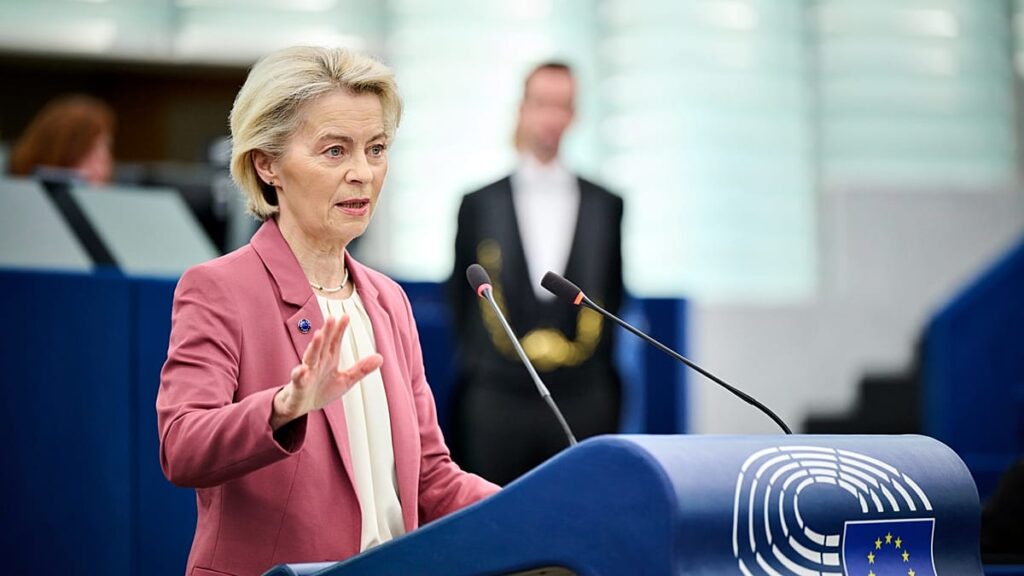Ursula von der Leyen has offered minor concessions on her €2 trillion draft EU budget to placate the four centrist parties that back her pro-European parliamentary majority but threatened to reject her ambitious blueprint if their demands were not met.
The tweaks foresee a stronger role for regional authorities, a new target to ensure a minimum of funds flows into rural areas and expanded oversight powers for the European Parliament. None of them alter the fundamental structure of the plan.
The draft changes were discussed on Monday in a crisis meeting among the heads of the three institutions: Ursula von der Leyen, the president of the European Commission; Roberta Metsola, the president of the Parliament; and Mette Frederiksen, the Danish prime minister, acting as the rotating presidency of the European Council.
“We now have a solid understanding of the proposals and a clear path forward,” von der Leyen said after the virtual meeting, which she described as “constructive”.
Metsola was also positive, calling the amendments a “good step forward”, while Frederiksen hailed a “fruitful” exchange that confirmed the “joint ambition”.
For the 2028-2034 budget, von der Leyen and her team have pitched a profound revamp of the common pot, reducing the number of programmes and the share of pre-allocated funds to allow greater flexibility for unexpected crises.
But her enthusiasm for reform has met intense resistance from the EU parliament.
Last month, the European People’s Party (EPP), the Socialists & Democrats (S&D), the liberals of Renew Europe and the Greens teamed up in a letter addressed to von der Leyen, requesting an “amended proposal” to the draft budget as a precondition to engage in negotiations, which are still in very early stages.
At the centre of the dispute are the National and Regional Partnership Plans (NRPP), which would bring together the two largest financial envelopes – the Common Agricultural Policy (CAP) and the cohesion funds – alongside social policy, fisheries and maritime policy, migration, border management and internal security.
The four parties have argued that the all-encompassing plans would lead to fragmentation, undercut solidarity, distort the single market and excessively empower central authorities to the detriment of regional and local institutions.
They have also called for the Parliament to be given “full decision-making” powers in setting the budget priorities each year.
Von der Leyen’s balancing act
Initially, the Commission responded vaguely to the joint demands, stating it was willing to listen to lawmakers without making any specific commitments.
Then, the four parties upped the ante and tabled a resolution that, if approved, would have represented a symbolic – yet powerful – rejection of the proposed budget.
Von der Leyen’s standing in the Parliament has been weakened by a series of motions of no confidence against her, which she has until now comfortably survived. The resolution, scheduled for a vote on Wednesday, risks further damaging her image in the hemicycle.
The concessions to the budget are a clear attempt to stave off the rebellion, as they directly address the concerns raised by the four parties last week. A Parliament official told Euronews that the resolution would likely be withdrawn as a result.
The tweaks are precise and tailor-made to the dispute at hand.
Von der Leyen retained the contentious national plans, worth €865 billion across seven years, but added a “rural target” to dedicate 10% of unallocated funds to the development of agrarian territories. This safeguard would come on top of the €300 billion in “ring-fenced” funding for farmers.
Regional authorities, which have criticised the draft budget from the start, would be given greater responsibility in the adoption and implementation of the national plans.
Additionally, the Parliament would be part of a “steering mechanism” to identify, together with the Commission and the Council, the budget priorities for each year.
Broader changes could have derailed the process and triggered the ire of member states, who are adamant on preserving their lead in the talks. The budget needs to be unanimously agreed upon by the 27 leaders, ideally by December next year.
Von der Leyen’s concessions are “sensible” and “overlap considerably” with some of the concerns that member states are privately discussing, a senior diplomat said.
“It’s only reasonable and fair that Parliament raises political concerns on this issue,” the diplomat said, noting the core elements of the negotiations should remain in the hands of member states, which finance the budget through proportional contributions.
Still, the fact that the Commission has offered to make changes to one of its proposals after having made a formal presentation – a highly unusual step in Brussels – is a political win for the European Parliament.
“Today marks an important victory for the European Parliament in defending farmers and regions in the next long-term EU budget,” said Siegfried Mureșan, a centre-right MEP who acts as co-rapporteur in the file, adding: “There is still room for improvement.”
The changes envisioned by von der Leyen will not require the presentation of brand-new legal texts. Instead, they are seen as suggestions to be added by co-legislators.
In a letter addressed to Metsola and Frederisken, the Commission president made it clear she would stick to the reforming philosophy of her original design.
“The current EU budget was designed for a world that no longer exists,” she wrote.
“As global changes intensify, EU policies are increasingly interconnected. It is therefore essential to foster synergies to maximise the impact of EU spending.”
Read the full article here

